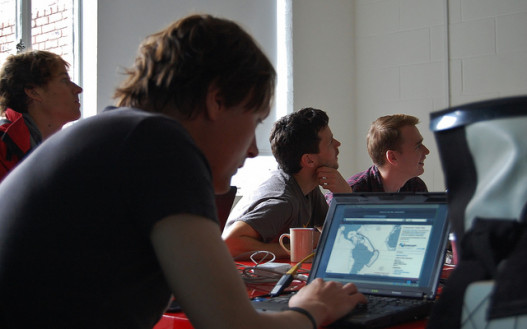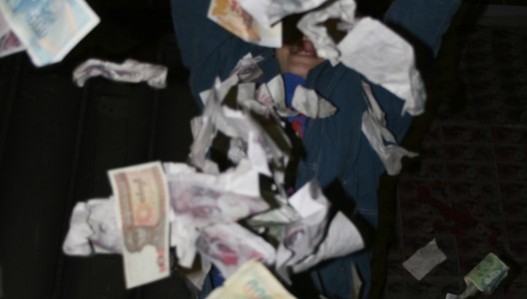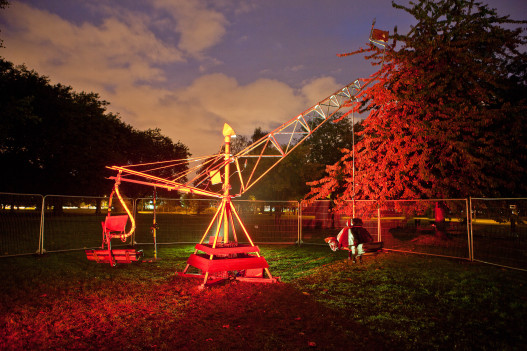Are we the relief workers of the new collapse?
Fri 22 Aug 2014“Can the slow-moving revolution we’re living through be won by those who can overthrow the increasingly elaborate systems of fear-mongering via the making and sustaining of clarity?” – Lucky Pierre
Chicago based collective Lucky Pierre, as Lucky Pierre Free University (LPFU), have chosen 14 participants from our DIY Open Call to enroll in their seminar The Sky Is Falling, The Money Is All Gone.
Co-opting the “free” on-line course model of corporatised higher education, LPFU have composed an 8 week syllabus which will facilitate participants as they create responses to themes of environmental and economic fragility, considering questions such as “Are we the relief workers of the new collapse” and “How can artists respond and work against despair amid evidence of ongoing economic, environmental and social fragility?”.
Short assignments, in the form of weekly prompts, will guide our troupe of artists as they generate material (performance, writing, video, music, visuals etc) which will in turn inform and offer new processes and methods for furthering their own practices post-seminar.
In preparation for the upcoming study sessions LPFU circulated a series of essential questions to participants for their consideration. These open ended inquiries are designed to promote debate and discussion with no single fixed answer; they point towards critical ideas which can be approached from a variety of disciplines and angles, recurring repeatedly over time.
Below are a few of the questions they circulated and we thought it was a timely moment to revisit our archive to see what perspectives/ responses artists have provided to these ongoing quandaries.
We are encouraged to believe that CCTV is there to preserve our safety, but who is watching us and why? In 2011 Paolo Cirio came to Liverpool with Transparent Cities, aiming to balance our asymmetrical relationship with surveillance and expose the lack of transparency in contemporary societies.
Likewise, the internet has become a ‘place’ which many of us visit everyday, but few people truly understand how computer networks can be used to manipulate us. In 2013 artist Julian Oliver’s NETworkshop sought to address this lack of knowledge by teaching students how to read network topologies as political control structures.
2012 brought the Olympics to Britain and there were divided opinions over what the world’s biggest sporting event would mean for the host country in the wake of a global financial collapse. These issues were chewed over by speakers at our Too Big To Fail? talk, featuring John Gold, James Kennell and Jennifer Jones.
Since then austerity policies in the UK have continued to impact upon artists and arts organisations. The Art of Success asked how impoverished yet impassioned creators navigate these monetary and social constraints.
Exploring the successes and failures of capitalism, our 2012 exhibition What Have I Done to (De)serve This? included works by Jennifer Chan, Tom & Guy Schofield, Jan Peter and Lanfranco Aceti responding to the perpetual disillusionment of a generation of artists working within an economic disaster zone.
Before 2008, and the ensuing recessions, we were encouraged to enhance our lifestyle and augment our expendable income through credit. Steven Ounanian’s performance Monetised explored the power of financial forces and our desires.
A poignant reminder of the fragility of advanced technological societies, Plan C brought a piece of Chernobyl to Manchester in 2010 as a reminder of what was lost, and a celebration of what can be salvaged in the face of industrial and environmental disasters.
Working with men and women from the Northwest who had experienced active duty in the armed forces, Krzysztof Wodiczko’s War Veteran Vehicle aimed to foster a better understanding of the impact of social reintegration on veterans and their families following their return. Wodiczko’s project was a reminder that even the worst human experiences can be transmuted and, maybe, overcome.
Recent Journals
- Introducing Commons // Keiken and Jazmin Morris
- Introducing our Creative Associates programme
- Reflections on the Associate Board Member Programme
- The Future of Arts Governance
- Rendering our virtual, net and digital discourses
- Announcing a new partnership between AND and the School of Digital Arts
- Impossible Perspectives 2024
- AND’s new Board Members and Associate Board Members
- Introducing AND’s new Directors
Other Journals
-
2025
-
2024
-
2023
-
2022
-
2021
-
2020
-
2019
-
2018
-
2017
-
2016
-
2015
-
2014
-
2013
-
2012
-
2011







